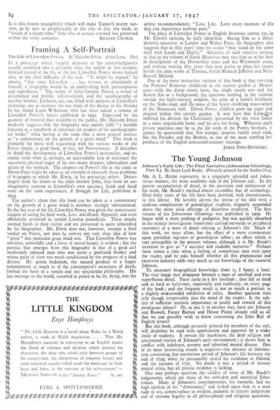Framing A Self-Portrait
The Life of Llewellyn Powys. By Malcolm Elwin. (John Lane. 15s.)
IN a postscript which happily disposes of 'the acknowledgments usually crammed into a prefatory note, the author of this straight- forward record of the life of the late Llewellyn Powys shows himself alive to the chief difficulty of his task. " It might be argued," he admits, "that since Llewellyn . . . has written so abundantly of himself, a biography would be an undertaking both presumptuous and superfluous." The works of John Cowper Powys, a writer of determined and prolific self-revelation, and• the autobiography of another brother, Littleton, are, too, filled with analyses of Llewellyn's character, not to mention the use made of his diaries in his lifetime by his friend Louis Wilkinson, who has since edited a volume of Llewellyn Powys's letters published in 5943. Impressed by the quantity of material thus available to the public, Mr. Malcolm Elwin modestly suggests that this biography may merely fulfil "a humble function as a handbook of reference for readers of his autobiographi- cal books," while having at the same time a more general interest as "a commentary on the growth of a great "mind." This book is primarily for those well acquainted with the various works of the Powys family, a good book, in fact, for Powys-lovers. It describes in detail the development of Llewellyn Powys's personality, and re- counts (with what is, perhaps, an unavoidable lack of reticence) the successive physical stages of his two major diseases, tuberculosis and ulcers of the stomach. The chapters on Powys's life at the clinic at Davos-Platz might be taken as an example of precisely those problems of biography to which Mr. Elwin, in his postscript, refers. Drawn largely from his letters to his elder brother John, they form an un- imaginative contrast to Llewellyn's own succinct, frank and lucid essay on the same experiences, A Struggle for Life, published in 1934.
The author's claim that this book can be taken as a commentary on the growth of a great mind is nowhere strongly substantiated. In the last year of his life Llewellyn Powys was given the unnecessary chagrin of seeing his final work, Love and Death, ffippantly and even offensively reviewed in certain London periodicals. These attacks seemed harsh to their victim and are presented as quite unjustified by his biographer. Mr. Elwin does not, however, attempt a final verdict on Powys, nor does he convey any very clear idea of how " great " this particular great mind was. That Llewellyn Powys was sensitive, unworldly and a lover of moral beauty is evident ; but the portrait that emerges from this biography is that of a good awl moderately talented man who was never a profound thinker and whose point of view was much conditioned by the progress of a fatal disease. His gentle hedonism, the natural product of a happy temperament as much as of the consumptive's awareness of death, formed the basis of a simple and not spectacular philosophy. His last message to the world, scrawled in pencil as he lay dying, was the artless recommendation: "Love Life. Love every moment of life that you experience without pain."
The place of Llewellyn Powys in English literature cannot yet, in Mr. Elwin's opinion, be fully identified. Seeing him as a direct dynastic successor to Landor and Walter Pater, his biographer also suggests that in fifty years' time his essays "may stand on the same shelf with Lamb and Hazlitt." Admirers of such sensitive writing as that in the volume of Earth Memories may rate him as at his best in descriptions of the Dorsetshire lanes and the Weymouth coast, and without waiting fifty years they may prefer to place his essays beside the calm works of Thoreau, beside Richard Jefferies and Mary Russell Mitford.
One of the most instructive sections of this book is that covering the Powyses' Somerset childhood in the rectory garden at Monta- cute—with the damp tennis lawn, the single maple tree and the Scotch firs as a background, the sparrows rustling in the jasmine outside the night-nursery_ window, the echo of a horse's hoofbeats on the Stoke road, and the noise of the heavy revolving water-wheel of the Montacute mill. Eleven Powys children grew up eager and original within this rectory garden. It was here that Llewellyn imbibed his distaste for Christianity (presented by his stern father in a most unpalatable form) and his zest for living. Whatever one's private reactions may be to-the life work of the Powys brothers, it cannot be questioned that this strange, Creative family must rank, like the Froudes and the Brontes, as one of the most startling by- products of the English nineteenth-century vicarage.
JAMES POPE-HENNESSY.


































 Previous page
Previous page